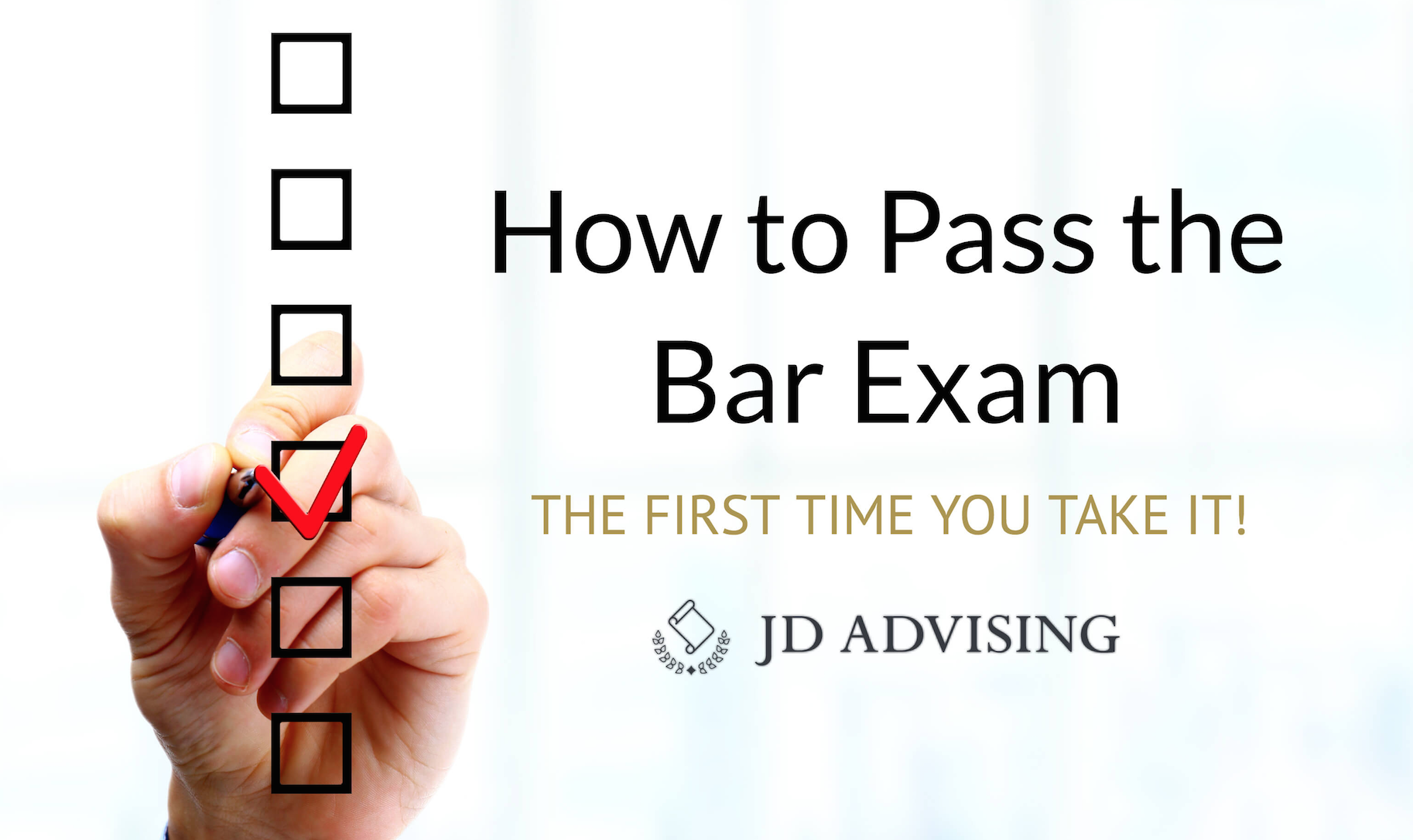How to Pass the Bar Exam: Start in Law School!
Step One of How to Pass the Bar Exam:
Start in Law School!
If you are reading this in law school, great! There are several steps you can take in law school to get you closer to passing the bar exam. Here, we discuss those steps.
1. Do the best that you can in your law school classes—and memorize as much law as you can.
Statistically speaking, the better you do in law school (especially your first year), the more likely you are to pass the bar exam. So, working hard in law school will pay off in multiple ways—it will boost your GPA, job opportunities, internship opportunities, law school opportunities (i.e., law review, moot court, etc.), scholarship opportunities, and your chances of passing the bar exam!
So, the best way to get a head start is to work hard in law school from the beginning!
2. Take classes that will help you pass the bar exam.

Many students wonder which classes will help prepare them best for the bar exam. The following substantive classes will be beneficial (especially if you are in a Uniform Bar Exam (UBE) state).
Tier one: classes you should definitely take
The classes that you should definitely take in law school to prepare for the Uniform Bar Exam are (UBE) classes that are double-tested on both the multiple-choice and written portion of the bar exam. Each of the following subjects will have 25 multiple-choice questions (on the Multistate Bar Exam [MBE]) that test on them, and they could come up on the essays (the Multistate Essay Exam [MEE] portion of the UBE). These subjects are Real Property, Torts, Evidence, Constitutional Law, Contracts and Sales, Criminal Law and Procedure, and Civil Procedure.
All are important to take! But here is what we recommend signing up for in order of most-to-least important!
- Evidence. This is a difficult subject. You will see 25 multiple-choice questions on Evidence and it has come up more and more on the essay portion. Take a semester to learn Evidence rather than trying to learn it in two days. You will be very grateful you did.
- Real Property. Some law schools do not require law students to take Real Property. If you attend one of these law schools, make sure you take this critical class. It is difficult and, again, it could be double-tested—on the multiple-choice and essay portion.
- Contracts and Sales. Every law school that we know of requires at least one semester of Contracts. However, some do not require more than that and some do not teach Sales at all. Most law schools have additional classes you can take—e.g., Sales and Leases or Contracts II. Take these classes. Again, Contracts is a difficult subject and it is double-tested. Getting as much exposure to it as possible in law school is a great idea.
- Constitutional Law. Not all schools require Constitutional Law as a first-year course, and those that do often have additional Constitutional Law classes that they offer (e.g., Constitutional Law II, classes on the First Amendment, etc.). Take this important class in law school. It is tested on both the multiple-choice and written portion of the bar exam and can be tricky.
- Criminal Law and Criminal Procedure. While Criminal Law and Procedure make up 25 MBE questions (half on Criminal Law and half on Criminal Procedure), these subjects are tested a little less frequently on the MEE (the essay portion). Further, when it is tested on the essay portion, it is tested in a semi-predictable way. Most law schools require Criminal Law as a first-year course. (If yours doesn’t, you should probably take it!) Criminal Procedure is a little bit easier to learn than, say, Evidence, but we still recommend you take it if possible.
- Lastly, we assume Torts and Civil Procedure are required at your law school as they are required at all schools that we know of! However, if they are not, take these important classes to help yourself on the multiple-choice and written portion of the bar exam!
Tier two: classes that are a good idea to take
These law school classes are a good idea to take to prepare for the Uniform Bar Exam (UBE), but not essential. These classes are only tested on the Multistate Essay Exam (MEE) portion of the bar exam, not the multiple-choice section. So you may see an essay question on them, but you also may not! We recommend you take these classes and in this order of priority:
- Secured Transactions. We recommend this one first because it has been coming up more frequently (and it is such a difficult subject!).
- Business Organizations or Corporations, Agency, and Partnership. Corporations is especially hard for bar exam students to learn in just a lecture or two. So if your law school splits Corporations and Agency & Partnership into two classes, take Corporations! This is tested on the written portion with Corporations & LLC’s being tested about half the time and Agency & Partnership being tested the other half.
- Trusts and Estates. This one is trickier for some students! So it is not a bad idea to get some background on it in law school.
- Family Law. This one could go into category three (of optional classes) since it is not that hard to learn. However, since it is semi-frequently tested and since many commercial courses do not have the greatest family law outlines, it does not hurt to get some extra background on the subject.
Tier three: optional classes
- Conflict of Laws. This is tested on the MEE but is not a standalone subject—so you won’t see it tested by itself, but rather, will see it combined with other subjects. Further, it does not show up very often! And when it does, it is tested in semi-predictable ways.
Note that classes like Immigration, Tax Law, Bankruptcy, and Negotiable Instruments are not tested on the Uniform Bar Exam so will not be beneficial for you to take if you are looking for classes specifically to help you pass the bar exam! If your state administers a state-specific exam, please check to see which subjects are tested on that exam prior to choosing your course schedule!
3. Take classes that will improve your writing skills.
Writing is an important skill, and is even more important if your jurisdiction administers the Multistate Performance Test (MPT). (Note: If you are in a Uniform Bar Exam jurisdiction, then you will have to take the MPT portion of the exam. Most non-UBE states, including California, also include a performance test portion in its bar exam.)
Any class that will help you improve your writing skills, such as a legal writing class or an internship with practical tasks (e.g., writing a brief, memo, letter, complaint, etc.) will help you indirectly on the bar exam. It is more important to take substantive law classes, but keep this in the back of your mind when choosing law school courses.
4. Take any bar exam course your school offers.
 Many law schools now offer some sort of “early start” bar prep course where you learn bar exam skills as well as some substantive law. These courses can be helpful because they can introduce you to the bar exam and start to prime you on the necessary skills to develop before you even start officially preparing for the bar exam.
Many law schools now offer some sort of “early start” bar prep course where you learn bar exam skills as well as some substantive law. These courses can be helpful because they can introduce you to the bar exam and start to prime you on the necessary skills to develop before you even start officially preparing for the bar exam.
Further, many law schools offer these for credit toward graduation. It is worth it to consider taking a bar exam course offered by your law school, even if not technically required.
5. Get to know your bar support person as well as any resources your school may offer.
Many law schools have an academic success director who is in charge of law student success as well as bar exam preparation, or a bar exam director who is solely responsible for maintaining or improving bar exam pass rates at the school. These academic support faculty members can be a great source of information about the bar exam.
It is also worth it to ask them if the school offers any supplemental resources. Law schools will sometimes offer supplements to a commercial course. Sometimes these supplemental programs are run by the law school itself. Other times, the law school will outsource these programs to a commercial bar review course.
6. Consider studying for the bar exam early.
Some students should consider studying for the bar exam early. For example, you may want to consider studying for the bar exam early if you:
- Graduated near the bottom of your class
- Struggled a lot with first-year courses (these are the most heavily tested subjects on the bar exam)
- Plan on working full time during bar prep or face other time-consuming circumstances
- Have anxiety issues or feel overwhelmed easily
There are a lot of ways to start studying early for the bar exam. For example:
- Some bar review courses have early start options
- Some students find it helpful to review first-year class outlines
- Some students begin reviewing MBE or essay questions (we recommend doing this after you review the substantive law)
- Some students hire a private tutor to begin prep early
- Some students focus on the tips above (e.g., taking classes that cover subjects tested on the bar exam or a law school bar review course)
Go to the next topic, Step Two: Sign up for a Bar Review Course.
Looking to Pass the Bar Exam?
Free Resources:
- 🌟Bar Exam Free Resource Center: Access our most popular free guides, webinars, and resources to set you on the path to success.
- Free Bar Exam Guides: Expert advice on the MBE, the MEE, passing strategies, and overcoming failure.
- Free Webinars: Get insight from top bar exam experts to ace your preparation.
Paid Resources:
- 🏆One-Sheets: Our most popular product! Master the Bar Exam with these five-star rated essentials.
- Bar Exam Outlines: Our comprehensive and condensed bar exam outlines present key information in an organized, easy-to-digest layout.
- Exclusive Mastery Classes: Dive deep into highly tested areas of the MBE, MEE, MPT, and CA bar exams in these live, one-time events.
- Specialized Private Tutoring: With years of experience under our belt, our experts provide personalized guidance to ensure you excel.
- Bar Exam Courses: On Demand and Premium options tailored to your needs.
- Bar Exam Crash Course + Mini Outlines: A great review of the topics you need to know!
🔥 NEW! Check out our Repeat Taker Bar Exam Course and our new premier Guarantee Pass Program!








Leave a Reply
Want to join the discussion?Feel free to contribute!